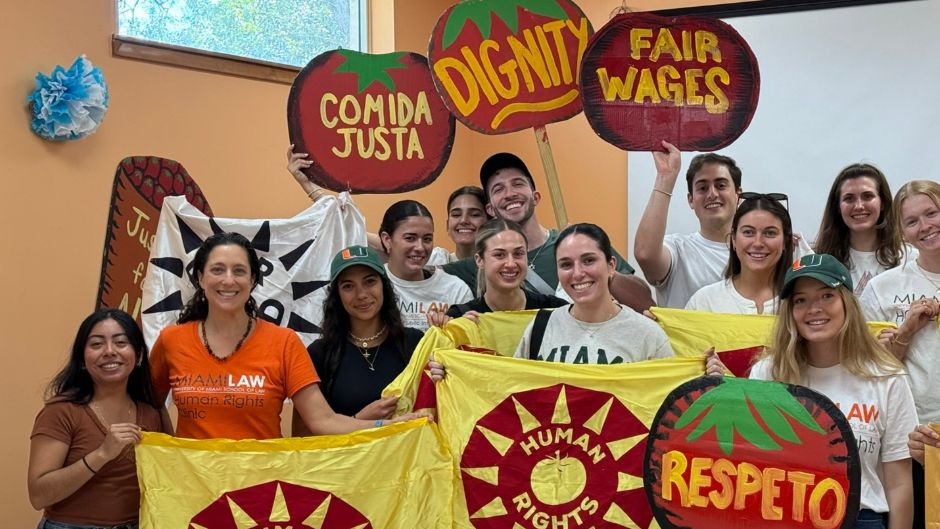Recently, 57 University of Miami School of Law students and their professors boarded a bus on campus and traveled across the state to learn from tomato farmworkers about one of the most successful human rights and corporate social responsibility campaigns in generations.
Along the way, the students got a history lesson on the University's longstanding support for the Coalition of Immokalee Workers (CIW), a worker-led human rights organization based in a small town near Naples, Florida.
Upon arrival in Immokalee, the students began an immersive site visit with CIW, learning about the organization's groundbreaking advocacy with some of the world's biggest corporations—including McDonald's, Burger King, Taco Bell, Walmart, Trader Joe's, and Whole Foods—to secure fair wages, equitable treatment, and robust protections for farmworkers in Florida and across the nation. Throughout the visit, students witnessed the intersection of grassroots, worker-led activism and creative legal advocacy in protecting farmworkers' rights.
The student group included first-year law students enrolled in the International Human Rights Law elective and second and third-year law students and LL.M.s enrolled in the Human Rights Clinic, both taught by professors Caroline Bettinger-López and Tamar Ezer.
The group engaged in in-depth discussions with CIW leaders, toured the organization's office, and painted signs and placards that read (in English and Spanish) "Justice!," "Equality!," and "Respect!" The group also visited the CIW's Modern-Day Slavery Museum, which vividly illustrates the ongoing struggles of farmworkers and the systemic labor abuses within corporate supply chains and traces a through-line between the history of slavery in the U.S. and exploitative systems in modern times.
The visit highlighted how CIW uses legal mechanisms, worker education, and community organizing to hold corporations accountable for labor abuses in the fields. CIW successfully initiated the "penny per pound campaign" – a movement advocating for major food retailers to pay an extra penny per pound for tomatoes purchased from Florida farms to improve working conditions and wages for farmworkers by ensuring that this additional cost directly benefits them through their paychecks. CIW's "Fair Food Program" resulted in new legally binding agreements benefiting farmworkers in Immokalee and expanded beyond Florida to include agricultural operations in nineteen states and Chile, South Africa, and Scotland.
The site visit also allowed the clinic students to consult with CIW staff and benefit from their expertise. The clinic has worked on various projects addressing women's rights and economic justice, including supporting Pan-African litigation and policy efforts to end gender-based violence in South Florida. This year, the clinic supports the African Commission on Human and Peoples' Rights in developing guidance and model laws on protecting workers' rights in the informal sector.
Human Rights Clinic students are currently engaged in a comparative analysis of progressive laws related to domestic and agricultural workers in the Americas. During the site visit, clinic students enjoyed a firsthand look at CIW's pioneering model and consulted with CIW staff on key issues that should be included in global guidance. Additionally, clinic students interviewed CIW staff about the organization's remarkable success in eliminating sexual violence in the fields through the FFP's worker-to-worker education and reporting mechanisms and through audits by the Fair Food Standards Council, the program's third-party monitoring body.
The site visit to Immokalee was transformative for the clinic students, one of nine clinical opportunities at the School of Law.
"The experience I had today was incredibly valuable and impossible to replicate within a classroom," wrote first-year law student Micah Zebersky to his professors upon returning to campus. "It was my first time visiting a true grassroots initiative. The people at the CIW are incredible and fight a constant uphill battle. Understanding their story is integral in understanding human rights on an international scale."
Similarly, first-year student Yasmin N Rizvi said, "As someone passionate about human rights, it is easy to be disillusioned by our country's often ineffective protections. Our trip to the Coalition of Immokalee Workers was a welcome reminder that meaningful change is possible, and that collective action holds immense power."
"UM has historically stood alongside CIW in pivotal moments and major campaigns," said one of CIW's campaign coordinators, Giselle Ramirez García. "During the site visit, students recognized their power not just as future lawyers, but also as consumers who can influence corporate behavior."
The students recounted the lessons they learned about solidarity with those who are most disenfranchised, as well as the potential for worker-led movements that incentivize corporations to do the right thing, not because of legal mandates alone, but because of their accountability to the very communities they impact.
"CIW's work demonstrates how storytelling and visual representation can make human rights issues more tangible and compelling to a broader audience," said third-year Human Rights Clinic student Tiana Rose Montague.
Read more about Miami Law's clinics.

